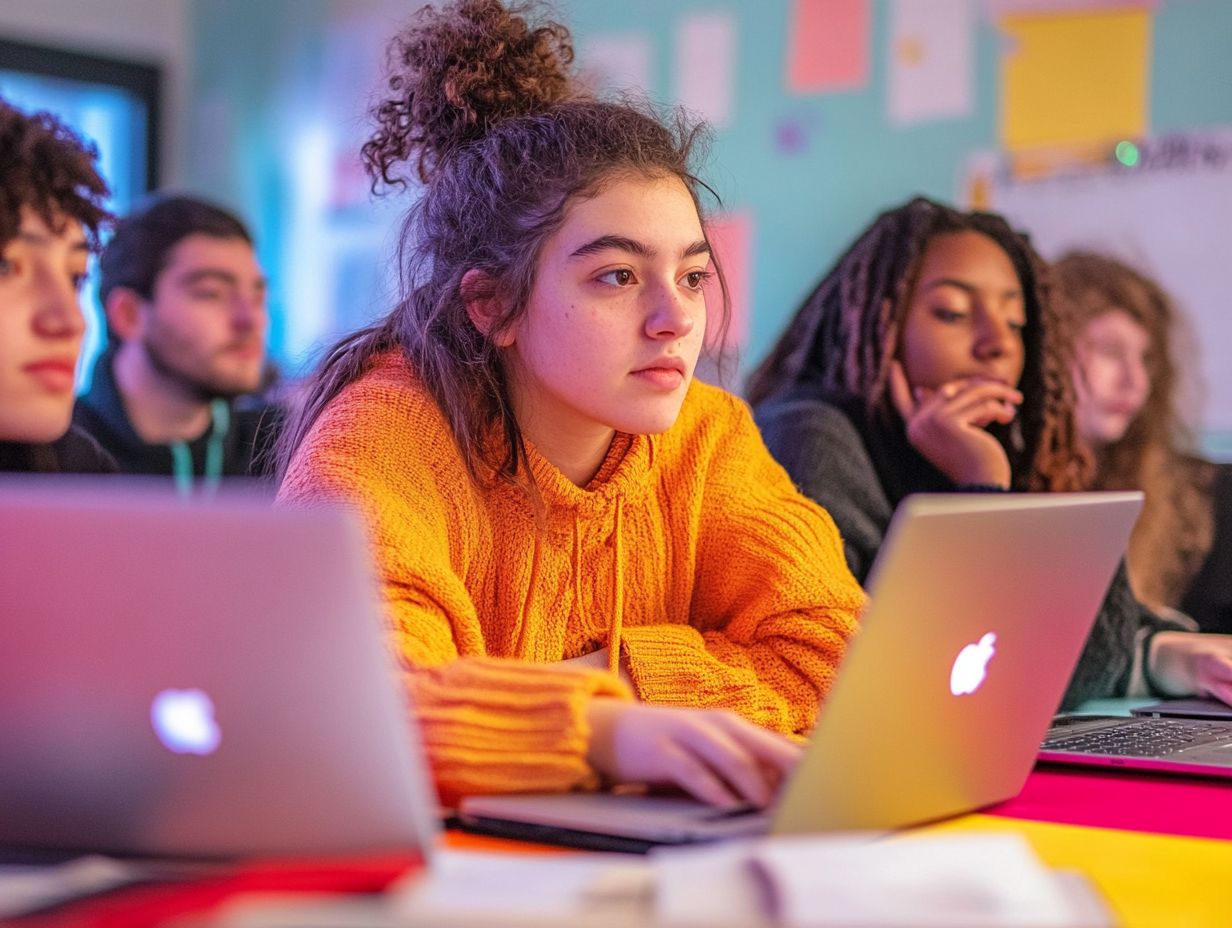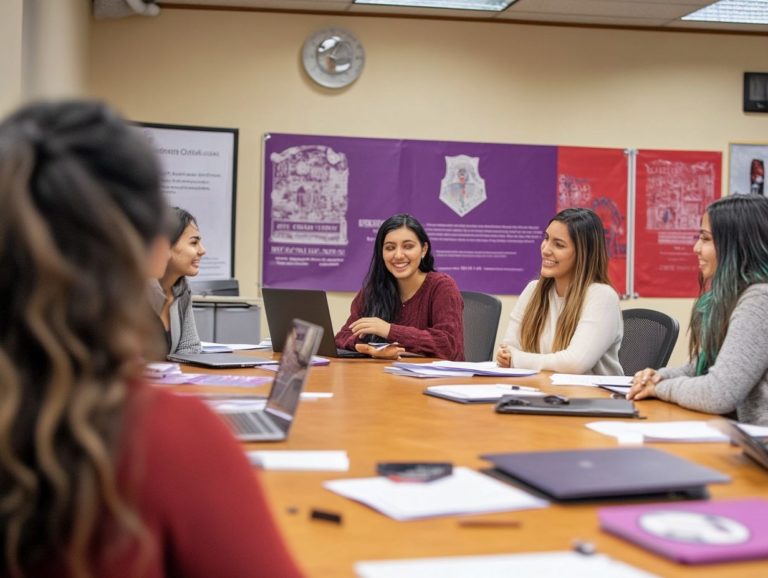5 Ways to Enhance Your Online Learning Experience
In today s digital era, online learning has revolutionized the way you educate yourself, providing unparalleled flexibility and accessibility.
However, navigating this virtual landscape can come with its own set of challenges. Whether you’re a student, a professional looking to acquire new skills, or someone eager to learn, optimizing your online experience is crucial.
This article delves into five practical strategies designed to enhance your online learning journey. From creating a dedicated study space to tapping into valuable resources, get ready to explore these insights!
Contents
- Key Takeaways:
- 1. Set Up a Dedicated Learning Space
- 2. Create a Schedule and Stick to It
- 3. Participate in Online Discussions and Activities
- 4. Take Breaks and Practice Self-Care
- 5. Utilize Online Resources and Tools
- The Impact of Online Learning on Education
- Frequently Asked Questions
- How can I enhance my online learning experience?
- What is the first step to enhance my online learning experience?
- Why is it important to have a dedicated study space?
- How can I improve my time management skills for online learning?
- How can I stay motivated while learning online?
- What are some ways to make online learning more interactive?
Key Takeaways:

- Create a dedicated learning space to minimize distractions and enhance productivity.
- Stick to a schedule and treat online learning as you would in-person classes to stay on track.
- Participate in online discussions and activities to actively engage with the material and your peers.
1. Set Up a Dedicated Learning Space
Creating a dedicated learning space is essential for optimizing your online learning environment. It improves your focus and helps mitigate distractions that often come with virtual education.
A well-defined space can significantly elevate your overall learning experience. It fosters an atmosphere that promotes academic success.
Pay attention to details like lighting; it can make a big difference in your study area. Natural light not only boosts your mood but also keeps you alert.
Adjustable desk lamps allow you to create a customizable environment that fits your needs. Organization is key keeping your materials tidy streamlines your study sessions, letting you access resources without wasting valuable time.
Ensure your educational tools are accessible across devices be it a tablet, smartphone, or laptop. This flexibility allows smooth transitions between different learning environments, making your education both efficient and adaptable.
2. Create a Schedule and Stick to It
Creating a structured schedule and sticking to it is vital for your success in online learning. It offers a clear roadmap for managing your time effectively and ensures that you meet all learning goals outlined in the curriculum.
When developing a flexible lesson plan, include a variety of instructional strategies that cater to different learning styles think visual, auditory, and kinesthetic. This approach keeps interest alive and fosters active participation, enhancing comprehension.
Incorporate regular check-ins and assessments to help track progress consistently. This allows for necessary adjustments along the way.
A well-structured schedule ensures you complete assignments on time and cultivates a sense of routine and accountability. This significantly boosts engagement and contributes to your online course success.
3. Participate in Online Discussions and Activities
Participating in online discussions and activities can elevate your learning experience. It creates a space where you can learn together, sparking motivation through active engagement with peers and instructors.
When immersed in these dynamic environments, you uncover deeper insights and perspectives that enrich your understanding of the course material. Engaging with fellow learners clarifies concepts and cultivates your critical thinking and problem-solving skills.
Employ effective engagement strategies, like feedback mechanisms, to receive constructive critiques on your contributions. This reinforces your grasp of the subject matter.
Collaborative tools such as discussion forums and group projects create a rich landscape for interactive learning. Here, you can explore ideas, share resources, and support one another on your educational journey.
Now that you’ve learned these strategies, implement them in your online learning experience! Share your thoughts and experiences in the comments below.
4. Take Breaks and Practice Self-Care

Taking regular breaks and taking care of yourself is essential for maintaining your mental clarity. It helps you overcome any academic hurdles that might impede your learning, particularly in the realm of online courses and digital classrooms.
By integrating mindfulness practices like meditation and deep-breathing exercises into your routine, you can cultivate a more focused mindset. This will enable you to absorb information more effectively.
Engaging in regular physical exercise not only elevates your energy levels but also enhances your cognitive function. It ultimately improves your performance on assessments.
Relaxation techniques can reduce stress and anxiety, ensuring a balanced approach to your studies. When you prioritize self-care, you position yourself to fully utilize the learning tools and resources at your disposal. This leads to a more enriching educational experience and better outcomes in your academic pursuits.
5. Utilize Online Resources and Tools
By utilizing a variety of e-learning resources and tools, you enhance technology integration and enrich your educational experience. This approach opens up diverse avenues for content delivery and interactive learning.
Consider engaging learning platforms that offer structured courses alongside interactive quizzes. These reinforce concepts through immediate feedback. You’ll love the well-designed study materials that cater to your style, ensuring that your auditory, visual, and kinesthetic preferences are fully addressed.
When effective instructional design is employed, these online tools can create personalized learning journeys that captivate you and significantly boost knowledge retention. This multifaceted strategy fosters a dynamic educational environment where you can truly thrive.
The Impact of Online Learning on Education
The rise of online learning has undeniably transformed the educational landscape, especially accelerated by the Covid-19 pandemic. This shift has compelled educational institutions to embrace distance education as their primary mode of instruction, highlighting various knowledge gaps that online formats can effectively address.
This transition has not only changed how content is delivered but has also redefined the essential relationship between you and your instructors. With traditional classrooms giving way to virtual platforms, educators have had to innovate, employing tools like video conferencing, online discussion forums, and interactive assignments to engage you more effectively.
For instance, data on how students are learning has become invaluable, allowing institutions to monitor your participation and assess engagement levels through data-driven insights. By analyzing metrics such as assignment completion rates and discussion participation, educators can better identify students who may be struggling and provide tailored support, addressing those knowledge gaps with a personalized touch.
What Are the Advantages of Online Learning?
Online learning presents a wealth of advantages that cater to your unique educational needs. With flexible schedules, you can tailor your study times to fit your lifestyle. Personalized learning experiences allow you to engage deeply with the material in a way that resonates with you.
Mobile accessibility means that you can dive into successful online courses from virtually anywhere, making learning truly convenient. Don’t miss out on the flexibility! One standout benefit is that this gives you the power to progress at your own pace and focus on areas where you might need a bit more support.
With a vast array of e-learning resources at your fingertips think interactive simulations, video lectures, and lively forums your educational experience becomes rich and engaging. This dynamic environment encourages you to take ownership of your learning journey.
It acts as a catalyst for continuous improvement in educational techniques, allowing you to enhance your performance. You’ll find yourself adapting quickly to new challenges and developing critical skills essential for success in a rapidly changing global landscape.
What Are the Challenges of Online Learning?

Despite the numerous benefits of online learning, several challenges may arise. Maintaining student engagement and effectively integrating technology are critical to ensuring positive learning outcomes.
In a world filled with distractions like household noise or the pull of social media staying focused can feel like an uphill battle. Self-discipline is crucial in virtual settings, where the absence of a structured classroom routine can easily lead to procrastination.
The heavy reliance on technology adds another layer of complexity, as not all learners have equal access to devices or stable internet connections.
To navigate these obstacles, consider employing strategies such as:
- Interactive multimedia
- Establishing regular check-ins
- Creating a conducive study environment
These approaches can significantly enhance your learning experience. By fostering a community that values accountability and collaboration, you can overcome barriers and thrive in your educational journey.
How Can One Stay Motivated While Learning Online?
Staying motivated while learning online can be a real challenge, but with effective instructional design and clever gamification techniques, you can explore 5 ways to stay motivated in an online bachelor’s degree program to enhance your overall learning experience and stay engaged.
Incorporating these strategies allows you to track your progress through achievable goals, making your educational journey rewarding. Seeking feedback provides direction and creates a collaborative atmosphere that fosters growth.
Using interactive elements, like quizzes and discussion boards, transforms passive learning into an exciting experience. Gamification techniques like points, badges, and leaderboards add fun, boosting participation and knowledge retention.
What Are the Best Practices for Online Learning?
Implementing best practices for online learning involves adopting effective strategies that elevate your use of learning tools, keep track of your progress, and enhance student engagement with course content. Additionally, you can explore 5 ways to reduce college costs while online to make the most of your education.
To cultivate a dynamic educational environment, employ a diverse array of learning tools, such as multimedia presentations and vibrant discussion forums.
Encouraging interaction among peers enriches your learning experience, while clear learning goals give you the purpose and direction needed to navigate your educational journey.
The course content should be diverse and aligned with various learning styles. Elements like video lectures, readings, and hands-on projects cater to visual, auditory, and kinesthetic learners alike.
By blending these approaches, you can create an exciting and supportive online atmosphere that effectively supports your learning endeavors, utilizing essential tools for online students.
How Can Online Learning Be More Engaging and Interactive?
Enhancing your online learning experience to be more engaging and interactive involves integrating student support mechanisms, implementing interactive quizzes, and fostering collaborative learning in dynamic digital environments. For more tips, check out these strategies for effective online learning.
To create a truly immersive experience, employ a variety of engagement strategies that cater to diverse learning styles. For instance, integrating breakout groups allows deep dives into topics through discussions and collective problem-solving, cultivating a sense of community.
Peer assessments encourage evaluating each other’s work, promoting critical thinking and providing valuable feedback. Implementing feedback loops enriches the learning process, ensuring you feel supported and motivated.
Ultimately, combining these strategies nurtures collaboration, transforming your online learning environment into a thriving community where knowledge acquisition goes hand in hand with shared ideas and personal growth.
Frequently Asked Questions

How can I enhance my online learning experience?
Here are five effective ways to boost your online learning experience:
What is the first step to enhance my online learning experience?
Start by setting up a dedicated study space.
Why is it important to have a dedicated study space?
A dedicated study space helps you focus and reduces distractions. This way, you can dive deeper into your online learning materials.
How can I improve my time management skills for online learning?
Create a schedule and stick to it. Prioritize your tasks and avoid procrastination to stay on track.
How can I stay motivated while learning online?
Set specific goals and reward yourself when you achieve them. Finding a study buddy can also help keep you accountable and motivated.
What are some ways to make online learning more interactive?
Engage in online discussions and ask plenty of questions. Completing interactive assignments or quizzes can also help. Don’t hesitate to reach out to your instructor for extra resources or virtual office hours!






